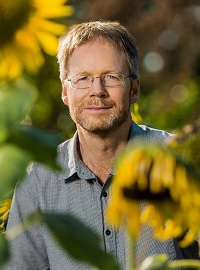
Professor
Univ. Killam Professor
Academic History
- M.Sc. University of Tennessee 1984
- Ph.D. Washington State University 1987
- Assistant Professor, Claremont Graduate School 1987-1993
- Associate/Full/Distinguished Professor, Indiana University 1993-2006
My Links:
Contact Information
- lriesebe@mail.ubc.ca
- 604-827-4540
- Office Room 204 Biodiversity Building (Lab room 350)
- Lab Phone: 604-827-3535
Research Interests
My lab employs population genomic approaches, computational methods, and field and greenhouse studies to study plant adaptation and speciation. We are especially interested in how gene flow, both within and between species, influences these processes. We also study factors that affect rates of gene flow, including reproductive barriers such as niche differentiation, phenological isolation, and pollen competition, as well as chromosomal inversions that impede gene flow mainly by suppressing recombination. On a more practical level, we integrate genomic and phenotypic data with results from laboratory and greenhouse experiments to identify evolutionary changes that causally drive plant invasions, mine natural populations for agronomically useful alleles, develop pre-bred lines to deliver these alleles to plant breeders, and generate genomic tools and resources for important crops such as sunflower and Cannabis.
Team Members
http://rieseberglab.botany.ubc.ca/people/
Selected Publications
Todesco, M., G.L. Owens, N. Bercovich et al. 2020. Massive haplotypes underlie ecotypic differentiation in sunflowers. Nature 584:602-607.
Ostevik, K.L., Samuk, and L.H. Rieseberg. 2020. Ancestral reconstruction of karyotypes reveals an exceptional rate of nonrandom chromosomal evolution in sunflower. Genetics 214:1031-1045.
Huang, K., R.L. Andrew, G.L. Owens, K.L. Ostevik, and L.H. Rieseberg. 2020. Multiple chromosomal inversions contribute to adaptive divergence of a dune sunflower ecotype. Molecular Ecology 29:2535-2549.
Lee-Yaw, J.A., C.J. Grassa, S. Joly, R.L. Andrew, and L.H. Rieseberg. 2019. An evaluation of alternative explanations for widespread cytonuclear discordance in annual sunflowers (Helianthus). New Phytologist 221:515-526.
Hübner, S. et al. 2019. Sunflower pan-genome analysis shows that hybridization altered gene content and disease resistance. Nature Plants 5:54-62.
Owens, G.L., G.J. Baute, S. Hubner, and L.H. Rieseberg. 2019. Genomic sequence and copy-number evolution during hybrid crop development in sunflowers. Evolutionary Applications, 12:54-65.
Bock, D.G., M. Kantar, C. Caseys, R. Matthey-Doret, and L.H. Rieseberg. 2018. Evolution of invasiveness by genetic accommodation. Nature Ecology and Evolution 2:991-999.
Smith C.C.R., S. Tittes, J.P. Mendieta, E. Collier-zans, H. Rowe, L.H. Rieseberg, and N.C. Kane. 2018. Genetics of alternative splicing evolution during sunflower domestication. Proceedings of the National Academy of Sciences USA 69:789-815.
Badouin, H. et al. 2017. The sunflower genome illuminates the evolutionary history of the Asterids and provides new insights into oil metabolism and flowering time. Nature 546:148-152.
Barrett, S.C.H., R.I. Colautti, K.M. Dlugosch, and L.H. Rieseberg (Eds). 2016. Invasion Genetics: The Baker and Stebbins Legacy. Wiley-Blackwell, Oxford.
Yeaman, S. et al. 2016. Convergent local adaptation to climate in distantly related conifers. Science 353:1431-1433.
Ostevik, K.L., R.L. Andrew, S.P. Otto, and L.H. Rieseberg. 2016. Multiple reproductive barriers separate recently diverged sunflower ecotypes. Evolution Evolution 70:2322-2335.
Ortiz-Barrientos, D., Engelstädter, J., and L.H. Rieseberg. 2016. Recombination rate evolution and the origin of species. Trends in Ecology and Evolution 31:226-236
Todesco, M. et al. 2016. Hybridization and extinction. Evolutionary Applications 9:892–908.
Renaut, S., and L.H. Rieseberg. 2015. The accumulation of deleterious mutations as a consequence of domestication and improvement in sunflowers and other Compositae crops. Molecular Biology and Evolution 32:2273-2283.
Dlugosch, K.M. F.A. Cang, B.S. Barker, K. Andonian, S.M. Swope, and L.H. Rieseberg. 2015. Evolution of invasiveness through increased resource use in a vacant niche. Nature Plant, article number 15066.
Khoury, C.K. et al. 2014. The crops that feed the world: increasing homogeneity in global food supplies. Proceedings of the National Academy of Sciences USA 111:4001-4006.
Renaut, S., C.J. Grassa, S. Yeaman, B.T. Moyers, Z. Lai, N.C. Kane, J.E. Bowers, J.M. Burke, L.H. Rieseberg. 2013. Genomic islands of divergence are not affected by geography of speciation in sunflowers. Nature Communications 4, 1827.
McCouch. S. et al. 2013. Agriculture: Feeding the future. Nature 499:23-24.
Mayrose, I., S.H. Zhan, C.J. Rothfels, K. Magnuson-Ford, M.S. Barker, L.H. Rieseberg, S.P. Otto. 2011. Recently-formed polyploids diversify more slowly than their diploid relatives. Science 333:1257.
Blackman, B.K., J.L. Strasburg, S.D. Michaels, and L.H. Rieseberg. 2010. The role of recently derived FT paralogs in sunflower domestication. Current Biology 20:629–635.
Wood, T.E., N. Takebayashi, M.S. Barker, I. Mayrose, P.B. Greenspoon, L.H. Rieseberg. 2009. The frequency of polyploid speciation in vascular plants. PNAS 106:13875-13879.
Rieseberg, L.H., and J.H. Willis. Plant speciation. 2007. Science 317:910-914.
Rieseberg, L.H., T.E. Wood, and E. Baack. 2006. The nature of plant species. Nature 440:524-527.
Harter, A.V., K.A. Gardner, D. Falush, D.L. Lentz, R. Bye, L.H. Rieseberg. 2004. Origin of extant domesticated sunflowers in eastern North America. Nature 430:201-205.
Rieseberg, L.H., O. Raymond, D.M. Rosenthal, Z. Lai, K. Livingstone, T. Nakazato, J.L. Durphy, A.E. Schwarzbach, L.A. Donovan, and C. Lexer. 2003. Major ecological transitions in annual sunflowers facilitated by hybridization. Science 301:1211-1216.
Burke, J.M., and L.H. Rieseberg. 2003. The fitness effects of transgenic disease resistance in wild sunflowers. Science 300:1250.






